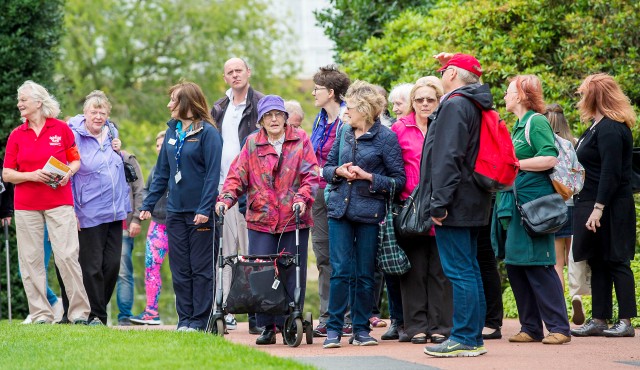 Over 90,000 people in Scotland are estimated to be living with dementia, and between 2006 and 2016, the number of adults with dementia in residential care increased by around 30%.
Over 90,000 people in Scotland are estimated to be living with dementia, and between 2006 and 2016, the number of adults with dementia in residential care increased by around 30%.
The transition into residential care can affect more than the individual with dementia, as most people have friends and/or family around them that will also have to readjust to their move. Carers can find themselves with a smaller role and less responsibilities for the individual and so can also struggle with the readjustment of the transition.
Such a significant change in a person’s life results in many losses, such as the loss of one’s home, daily routine and freedom (to some extent). Loss of identity is also a big issue for people living with dementia in residential care homes – to go from being a homeowner, a wife or husband, to a care home resident is a massive shift in self-identity.
There are also many stigmas associated with a diagnosis of dementia, such as dementia being the ‘end’ of someone’s life (either literally or socially) or that those with dementia in residential care are there because they are ‘hard to manage’. Carers, friends and family are also sometimes unfairly stigmatised as having ‘given up on the person’ and having ‘got rid of them to a care home’.
There is also a lack of understanding around the impact and causes of some of the more inconspicuous or ‘unresolved’ losses involved with a move to a care home which can affect both individuals with dementia and their carers.
Kenneth Doka, a Professor of Gerontology, first introduced the concept of ‘disenfranchised grief’ in 1989. He defined it as ‘grief that is experienced when a loss cannot be openly acknowledged, socially sanctioned, or publicly mourned’. Put simply, disenfranchised grief isn’t automatically recognised and doesn’t hold the obvious need for mourning, such as the death of a loved one. For example, losing one’s identity after living with family for a large part of your life can trigger grief that can often go unrecognised or belittled, leading to unresolved, disenfranchised grief, which in turn can lead to a vast array of problems, such as a decline in mental health or the onset of depression.
For a spouse who may have been caring for their partner for years, the sudden loss of responsibility and their caring role can be a massive shock. Not only will their daily routine change, but the absence of the person will be significantly notable.
Pauline Boss from the University of Minnesota describes this experience as someone being ‘psychologically present but physically absent’.
 Another threat to the well-being of individuals with dementia and their families is the risk of entering ‘anticipatory grief’. Clinical Psychologist Therese Rando believes that this can form from an individual accumulating all of their previous related losses, developing a negative attitude towards the future, and focusing mainly upon all of the losses yet to come. For example, a person living with dementia who is transitioning into residential care might think of all of their previous losses – their decline in cognitive ability, their potential reduction of social freedom – and so begin to think mainly of further future losses. For a person about to enter residential care, they may easily presume that this means the imminent loss of their freedom, dignity and social life.
Another threat to the well-being of individuals with dementia and their families is the risk of entering ‘anticipatory grief’. Clinical Psychologist Therese Rando believes that this can form from an individual accumulating all of their previous related losses, developing a negative attitude towards the future, and focusing mainly upon all of the losses yet to come. For example, a person living with dementia who is transitioning into residential care might think of all of their previous losses – their decline in cognitive ability, their potential reduction of social freedom – and so begin to think mainly of further future losses. For a person about to enter residential care, they may easily presume that this means the imminent loss of their freedom, dignity and social life.
Another factor that can increase the risk of disenfranchised grief is the sudden exposure to the deaths of other residents. While individuals are likely to have experienced the death of one or two people outside of residential care, their exposure to death will suddenly increase. This may inhibit individuals from being able to acknowledge and respond appropriately to each loss. Care staff are more likely ‘to be used to’ dealing with the death of residents, but for a new resident this can be overwhelming and scary.
So what can we do to ensure the general and mental well-being of all individuals transitioning into residential care, as well as that of their friends and family?
The Life Changes Trust has 5 main priorities relating to their dementia programme, based on what people with dementia and carers told them was important to them. They provide a solid base to begin to answer the above question. They are:
- I live in a place that suits me and my needs
- I am able to be as independent as possible
- I get the help I need when I need it
- I feel safe, listened to, valued and respected
- I am empowered to do the things that are important to me
Another of the Trust’s areas of work is challenging societal stigmas and negative discourses surrounding people affected by dementia. One of the best ways to break down barriers and stigmas of those affected by dementia is by finding ways in which they can continue to play a role and have a visible presence in local communities and projects.
By integrating those affected by dementia with the general population, we can begin to challenge any preconceptions that people may hold, such as the belief that those with dementia are unable to function independently anymore, or are unable to continue with everyday life and activities despite their diagnosis.
Dementia friendly communities such as those funded by the Life Changes Trust, allow a safe place for those affected by dementia to socialise and work alongside other people in the community. 
They also continually provide ways to break down preconceptions and beliefs that many people hold about people affected by dementia, both in and out of care settings.
I’ll talk in more detail about the Life Changes Trust funding for dementia friendly communities in part two of this blog.

